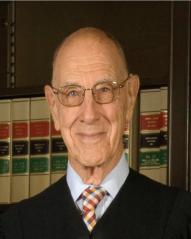|

 JOHNSTONE, EDWARD HUGGINS, 91, died Wednesday June 26, 2013. JOHNSTONE, EDWARD HUGGINS, 91, died Wednesday June 26, 2013.
He was preceded in death by his parents, William and Katherine Johnstone and his brother William Fraser Johnstone. Edward Huggins Johnstone was born April 26, 1922, in Brazil, where his father, William Johnstone, a noted horticulturalist, was on an agricultural mission.
He grew up in Paducah, a child of the Depression, the son of a county agriculture agent who felt that public officials should work on Saturdays, The C-J wrote in a 1980 profile.
After finishing high school in Lexington, he entered the University of Kentucky but dropped out in 1942 to join the Army. A Bronze Star and a Silver Star for his gallantry as an infantry sergeant in the Battle of the Bulge soon followed. He married, earned his law degree and had four children.
He is survived by his wife of 67 years, Katherine Guion Johnstone; sister, Katherine Elliott of Troy, MI; and brother, Robert Johnstone of Richmond; children, Anne Dill (Gerry), Taylorsville, Bill Johnstone, (Karen Newman), Eastwood, Mary Pepper Woolwine (George), Lexington, Fraser Johnstone (Tammy), Paducah; grandchildren, Jed English, Morgan Newman Armstrong, Guion Johnstone, Will English, Conrad Newman, Chlodys Johnstone, Stuart Dill; great-grandchildren, Sara Jo and Aubrey Kathryn Armstrong.
A memorial and celebration of life will be held at 2 p.m. on July 13, 2013 at St. Paul's Episcopal Church, Louisville KY. The family will receive visitors from 11 a.m. - 2 p.m. at the church.
In lieu of flowers, the family suggests donations to the Caldwell Country Free Clinic, 206 W. Main, Princeton, KY, 42445; Paducah River City Mission, PO Box 1000, Paducah, KY, 40023; Prodigal Ministries, 117 W. Oak Street, Louisville, KY, 40203, John Rosenberg Fellowship, Appalachian Research and Defense Fund, 120 N. Front Ave, Prestonburg, KY, 41653, The Edward Johnstone Scholarship at the University of Kentucky School of Law, 203 Law Building, Lexington, KY, 40502 or the charity of your choice . .
Fun Fact:
Edward H. Johnstone, the beloved federal judge renowned for reforming Kentucky's prisons and bringing humanity and compassion to his court in 30 years on the bench, died Wednesday. He was 91.
Vanessa Armstrong, chief clerk for U.S. District for the Western District of Kentucky, confirmed Johnstone's death. His son, Frazier Johnstone, said he died in Louisville at the Forum, where he lived with his wife, Kay.
"Ed Johnstone set the standard for what the trial judge should be," said Philip Shepherd, his former law clerk who was later Natural Resources secretary and is now a Franklin Circuit Court judge. "He had a tremendous work ethic and a passion for doing the right thing."
Cleve Gambill, the former U.S. magistrate judge and federal prosecutor, said Johnstone "was a towering figure in the courthouse" and "commanded more respect than any federal judge."
Former University of Kentucky law school dean Robert Lawson said, "I have never heard one negative word about Ed Johnstone from any lawyer or judge, and I have known thousands of them."
Johnstone was best known for transforming Kentucky's once "medieval" prisons into institutions considered reasonably safe and humane, by forging the historic 1980 settlement between inmates and the state of Kentucky.
But lawyers and litigants say his greatest legacy was in treating everyone with equal respect, from bank presidents to bank robbers.
He introduced himself as "Ed" and insisted on being treated like any other citizen. On his first day at work at the U.S. courthouse in Paducah, he ripped down the sign in the parking lot that said "Reserved for Federal Judge" and stuck it in his trunk.
He never used a gavel and held only one person in contempt, a government informant who refused to answer a question during the 1989 trial of a dozen members of the Hells Angels Motorcycle Club. Johnstone released him before he set foot in jail.
"People who respect you don't need to be coerced to make them behave," Johnstone once said.
Struggling to seat a jury as a circuit judge, Johnstone offered one prospective juror — a farmer who said he needed to be excused to cut tobacco — a deal. If the farmer would sit on his jury, Johnstone said, he would help him cut tobacco.
|



